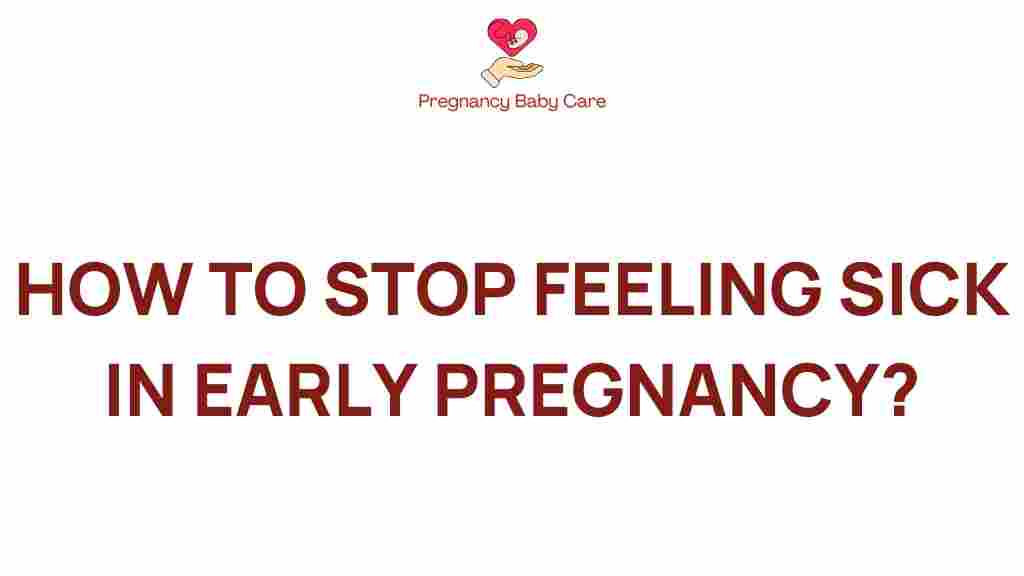Unlocking Relief: How to Stop Feeling Sick in Early Pregnancy
Congratulations on your pregnancy! While this is an exciting time, many expectant mothers experience a common yet challenging symptom: morning sickness. This condition can bring about feelings of nausea and discomfort, making it difficult to enjoy the early stages of pregnancy. In this article, we will explore effective strategies and remedies for nausea relief, helping you navigate the symptoms of early pregnancy with confidence and wellness.
Understanding Early Pregnancy and Morning Sickness
Morning sickness is a term used to describe the nausea and vomiting that many women experience during the first trimester of pregnancy. Despite its name, morning sickness can occur at any time of the day. It typically begins around the sixth week of pregnancy and usually subsides by the end of the first trimester, although some women may experience it longer.
Common symptoms of morning sickness include:
- Nausea
- Vomiting
- Food aversions
- Heightened sense of smell
While morning sickness is a normal part of early pregnancy, it can be distressing for many women. Understanding how to manage these symptoms is vital for your health and wellness during this period.
Effective Pregnancy Tips for Nausea Relief
There are several strategies that expectant mothers can employ to alleviate nausea. Here are some effective remedies and lifestyle changes to consider:
1. Dietary Adjustments
Your diet plays a significant role in managing early pregnancy symptoms. Here are some dietary tips:
- Eat Small, Frequent Meals: Instead of three large meals, opt for five to six smaller meals throughout the day to keep your blood sugar levels stable.
- Choose Bland Foods: Foods such as crackers, toast, and rice can be easier on the stomach. Avoid spicy, greasy, or overly rich foods.
- Stay Hydrated: Sip on clear fluids like water, herbal tea, or ginger ale to avoid dehydration.
- Incorporate Ginger: Ginger has been shown to help with nausea. Try ginger tea, ginger ale, or ginger candies.
2. Lifestyle Changes
Making some lifestyle adjustments can also aid in reducing nausea:
- Rest and Relaxation: Fatigue can worsen symptoms, so ensure you are getting enough rest. Nap when you can.
- Avoid Triggers: Identify and avoid smells or foods that trigger your nausea. Keep a log to see patterns in your symptoms.
- Fresh Air: Sometimes, a change of scenery can help. Try to get outside for fresh air or open windows for ventilation.
3. Natural Remedies
Many women find relief through natural remedies. Here are a few safe options:
- Acupressure: Applying pressure on specific points of the body, like the wrist, may help relieve nausea.
- Aromatherapy: Certain scents, such as lemon or peppermint, can be soothing. Use essential oils or scented candles.
- Herbal Supplements: Consult your healthcare provider about using herbal supplements like vitamin B6, which some studies suggest may help reduce nausea.
Step-by-Step Process for Managing Morning Sickness
To effectively manage morning sickness, consider following this step-by-step process:
Step 1: Monitor Your Symptoms
Keep a journal of your symptoms to identify what triggers your nausea. Note the time of day, what you ate, and any activities you were doing when symptoms occurred.
Step 2: Adjust Your Diet
Implement the dietary adjustments mentioned earlier. Focus on bland foods and frequent small meals to help stabilize your stomach.
Step 3: Incorporate Relaxation Techniques
Practice relaxation techniques such as deep breathing, meditation, or yoga tailored for pregnant women. These can help reduce stress, which may exacerbate nausea.
Step 4: Consult Your Healthcare Provider
If your symptoms are severe or persistent, consult with your healthcare provider. They can offer additional advice and may prescribe medications if necessary.
Troubleshooting Common Issues
Even with the best strategies in place, you may still encounter challenges. Here are some troubleshooting tips:
What to Do If You Can’t Keep Food Down
If nausea leads to vomiting and you struggle to keep food down, focus on hydration:
- Try sipping clear liquids slowly.
- Consider electrolyte solutions, like sports drinks, to help replenish lost nutrients.
- Seek medical attention if you are unable to retain any fluids for more than 24 hours.
When to Seek Medical Help
While morning sickness is common, it’s important to know when to contact your healthcare provider:
- If you experience severe nausea and vomiting that prevents you from eating or drinking.
- If you notice signs of dehydration, such as dark urine, dizziness, or a dry mouth.
- If you experience significant weight loss.
Conclusion: Embracing Self-Care in Early Pregnancy
Remember, managing morning sickness and nausea in early pregnancy is about finding what works best for you. Every expectant mother’s experience is unique, and it may take some time to discover the best remedies and strategies for your symptoms. Incorporating self-care practices into your daily routine can significantly improve your overall health and wellness during this exciting time.
For additional resources and support, consider visiting this helpful website that offers information on pregnancy health and wellness. Remember, you are not alone in this journey, and with the right tools and support, you can navigate early pregnancy with confidence.
With patience and care, you’ll soon be able to enjoy your pregnancy and look forward to welcoming your new baby into the world!
This article is in the category Pregnancy and created by PregnancyBabyCare Team
